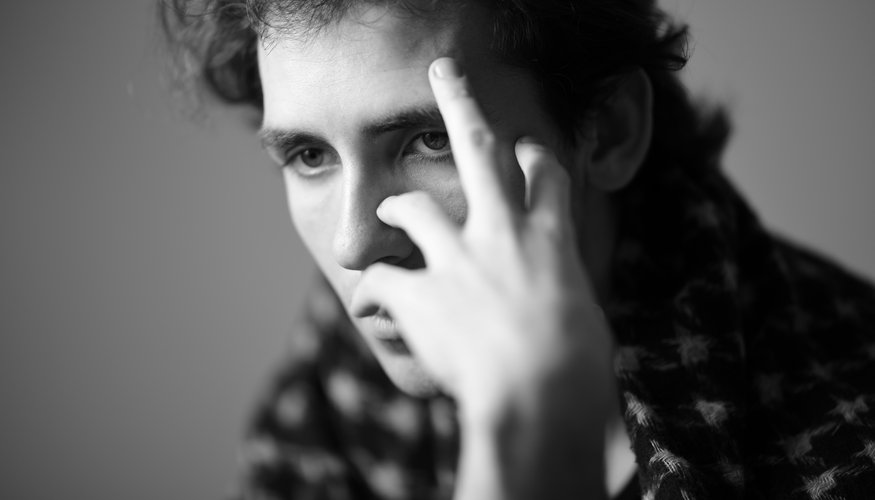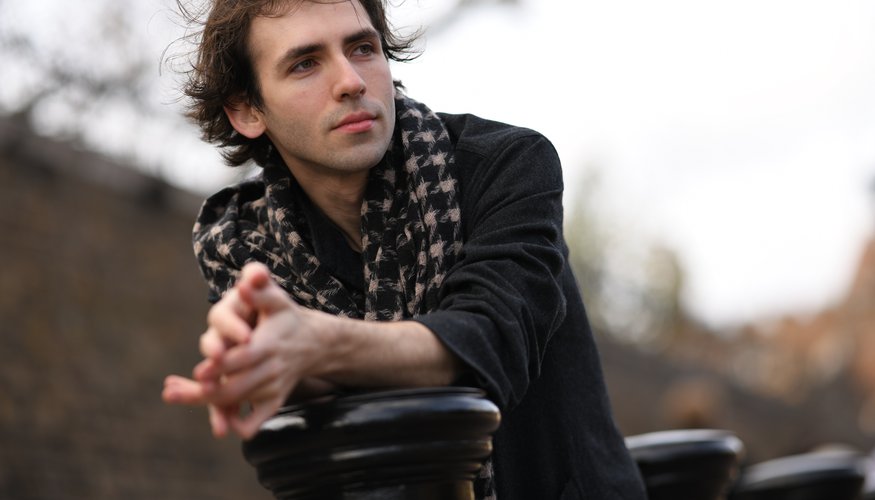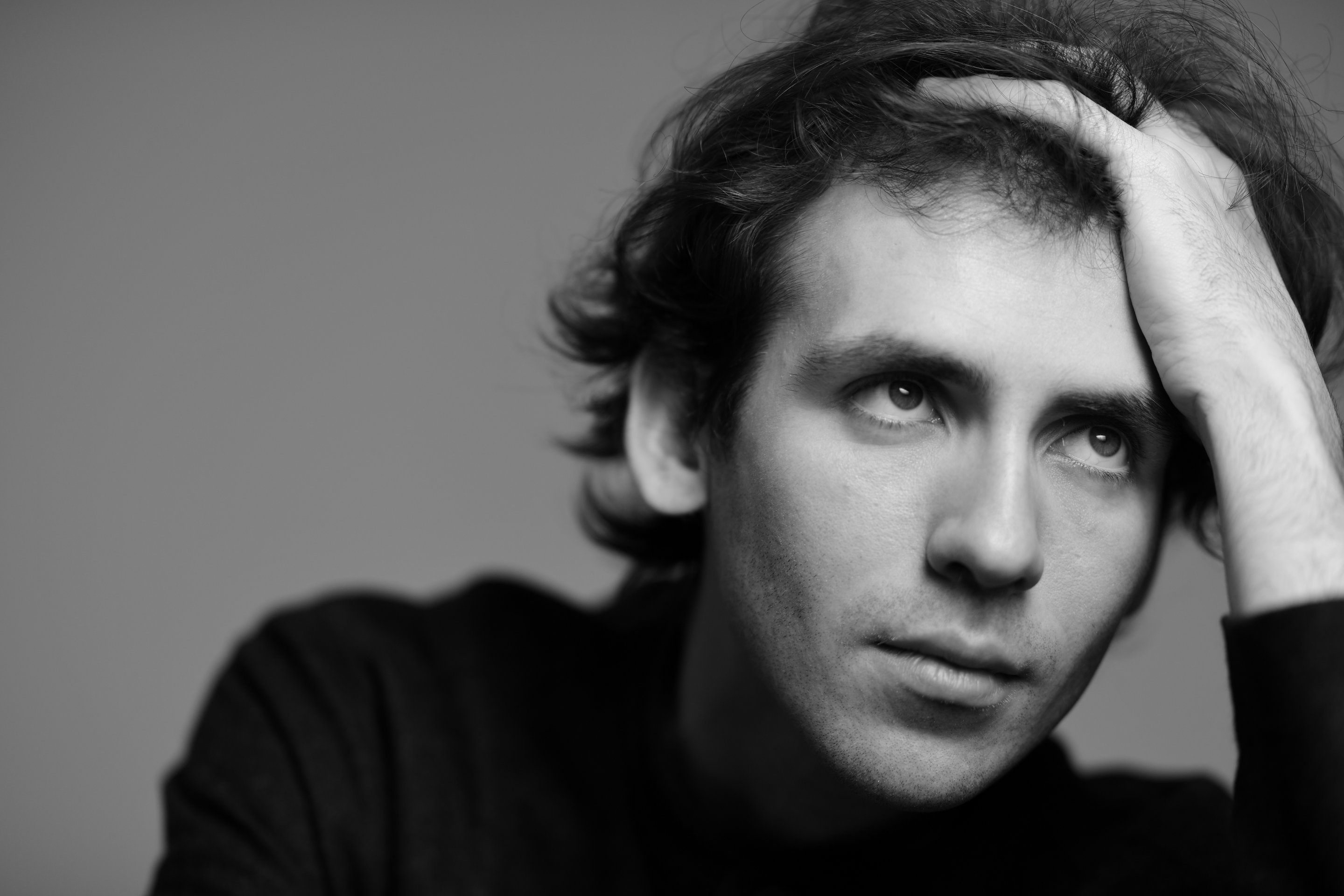Interview mit Alexandre Kantorow
Alexandre Kantorov is only 22 years old when he wins the famous Tchaikovsky Competition in Moscow in 2019 and is honored with the rarely awarded Grand Prix. And he is the first French pianist to claim this sensational success. A meteoric rise follows, Alexandre Kantorow conquers the great stages of the music world, enchanting audiences with his charm and the unique sound of his playing. In the 2023/24 season we may welcome Alexandre Kantorow as Artist in Residence at the Gürzenich Orchestra. With François-Xavier Roth he talks about his young career, his musical imprint and about his love for the music of Franz Liszt and Camille Saint-Saëns.

François-Xavier Roth: You know, we have something in common, you and I. We were both born into families of musicians. Before I had the pleasure of discovering you, I was a great admirer of your father, who is a conductor, a violinist and a soloist. The name Kantorow sounds like a name I have known forever, thanks to your father. What is it like to grow up in a family of musicians?
Alexandre Kantorow: Oh, I think it all depends on how your parents bring you up and in which area they give you space to express yourself. I was very lucky in that sense, as my parents were probably actually even slightly afraid of me becoming a professional musician as well. They know it can be a double-edged sword to actually be playing and following the same career as your parents. So for a long time, we were really not inside the world of music. I was in the suburbs, attending normal schools; I always had the pleasure of playing because we had a piano at home, and very quickly I loved the instrument. So my parents really brought me up in a world where music was an instinct and a game, rather than a profession. And then, as I grew up, the love of the stage took over and I really wanted to go on stage and perform.
FXR: You grew up near Paris?
AK: Actually, we moved all the time, but it was never far from Paris. I moved to Paris for the first time during high school, and this was a big shift because I attended a special music school. We were all playing music, and I think we discovered the joy of making music together: first concerts, a bit of adrenaline. And I was suddenly thrown into a world of musicians, where for the first time, people had actually known the name Kantorow for a long time. I suddenly discovered a whole group of people who had stories to tell me, and this was really quite fun.
FXR: In 2019 you won the famous Tchaikovsky Competition. How is it to be suddenly discovered by such a competition, and from one day to another to delve into this busy schedule of concerts, prestigious ones, that you have had since the competition? How was that for you?
AK: It's weird, and it's still not planned, and I still probably haven't processed it fully, even today. Of course when you enter a competition, you know that some winners suddenly skywalk, you see it with other people, you see how people's careers can change from a day to another. But it's a whole different thing to actually be in that spot, because it's a bit like the eye of the cyclone. There are enormous amounts of things happening around you, and at the same time, I think in my case I had a lot of psychological defence mechanisms activated, to just make me go and focus, and enjoy. So for a long time I think I was pretty unaware of what really happened, and I was really much more focused on the day-to-day.
But in a weird way, when COVID arrived nearly nine months after the competition – I realized how unprepared I actually was for this, this new life of touring. I was very hectic, getting extremely tired, not living healthily at all. Therefore, the only good things I can see in COVID, in my personal view, was the time to suddenly examine what this career was demanding and how I had to organize myself. Then I had a bit more time to understand what had happened and to know where I wanted to go, to have a bit more time also to go back to school, so to speak, to learn new repertoire, and really go and expand a bit and become more solid. But it demands a lot, and I think it's very easy to be blown around by the wind.

FXR: You are booked with great orchestras, great conductors, you play with soloists in chamber music, how is it, at your age, to digest all this music? Do you need time? Do you make your schedule including weeks where you only practice?
AK: Sometimes, because I have to, I do learn repertoire very quickly. I can play the notes, I can come up with ideas and instinct and the pressure of the stage will make something happen. But in general, yes, there's at least an amount of time, not even practicing the piece, but just an amount of time once you learn the piece, that it needs to sink in. I need that, generally. So most of the time now I try to learn a piece far in advance, and then let it rest and return to it. To me, this cycle of repeating and learning and then letting it rest is what brings you the most freedom in the body, and a lot of things are assimilated, so that you can really focus on key elements of the music, on high points, on the structure.
FXR: So let's go back to our country, France, because I think that this is something very interesting about you. Your culture of the sound, where does it come from? Because if I may say so, it's not at all typically French.
AK: It's hard to judge myself, but I would say that there is such a diversity of sounds because there's also a diversity of cultures. I grew up having a mixture of French and Russian teachers, and these Russian teachers, Igor Lazko and Rena Shereshevskaya, with whom I still work today, both came from a time in Moscow and St. Petersburg when the teacher was more important than the students. I feel that there was a very solid bond of words passed from master to students, that is very strong and goes back even to Rachmaninov. So you get a very special line of tradition that is intact and very focused on the sound, a lot of hearing the sound as long as possible. I know that in playing a melody, often both these teachers said, if you yourself hear the melody to the end, then the audience will. These are different focuses and priorities, combined with very interesting and extreme personalities that I also had as teachers, for example Pierre-Laurent Aimard, who is a genius of music, of piano, who absolutely has a creative world in his mind, and the manic energy about him that makes everything he does impactful and energetic. All of these teachers, I feel that I met them at a good time in my life. Maybe the mixture of sounds comes from this whole mixture of cultures and different ideas about music.
FXR: Your father is a conductor. In your way of learning and playing, do you have an orchestral culture? Because when I hear you, sometimes I hear double basses in a large orchestra, I hear a group of woodwinds, or a rich brass chord. I hear that your playing is very influenced by orchestral textures. Is this important to you?
AK: Yes, very much. I took a lot from my father, and a lot of it unconsciously, because I was young and I listened to him talk about music and playing music. I think the first influence was probably more his violin playing, because on the violin there are certain things that are natural. And then the culture of sound and orchestra came more in my adolescence, the period when I listened mainly to orchestra music, and because my father had all the orchestral scores, I would always look at them. I also studied with Frank Braley, who treats the piano as an orchestra. When we worked on Brahms, for example, this was very clear, because Brahms often treated the piano as if he were writing symphonies, especially in his early years.

FXR: It’s very interesting that for your concert with the Gürzenich Orchestra, you brought two composers who were actually great friends, Camille Saint-Saëns and Franz Liszt. I am very touched by that, because I think Franz Liszt was a great friend of so many composers and a great supporter of so many composers. Could you tell us about your perspective on these two composers and these two concerti?
AK: Liszt was a central figure in the romantic century. He was one of the most, if not the most well-connected musician of all times, because his creativity touched upon on every subject. I think you can hear that, especially in the treatment of the Second Piano Concerto, where he takes the idea, already present in Beethoven and Schubert, to connect movements, to connect a symphony or a sonata in one big thread. This is a concerto that I feel also has a very good place for the piano, because the piano finds a lot of different key roles. There's a lot of chamber music, there are a lot of big moments of course. It has a playfulness in the orchestra that goes beyond a simple orchestra part, and then then soloist enters and plays.
To me, this makes for a really great journey, because I feel Saint-Saëns has perhaps not the same ways of doing it, but he still wants to create a work that goes beyond a simple idea of a concerto. He also has a lot more playfulness in tone, especially in the Fifth Concerto where he finds incredibly creative ways to make the piano resound. I've never seen writing where there are these nearly Buddhist moments, where he finds a way to create the harmonics that emerge from the piano, just by arranging notes, and I've never seen this done afterwards either. These pieces offer an unusual space for expression, and to also play with and react to an orchestra. I think this is part of the joy of being able to work with an orchestra, and these pieces get the best out of that.
FXR: And what is it like for you to have this residency with the Gürzenich Orchestral?
AK: Well, this residency is incredibly important for me. Especially today, we go very quickly from orchestra to orchestra, and we very rarely have the time to really get to know an orchestra and to work with them and take time to play different pieces. So the feeling of the bond that is created when in you play with an orchestra a few times, and with you also, is something that is very rare and very precious. This, for me, is special. Thinking of Cologne, one of my favourite pieces of all time is the double concerto by Brahms, which was premiered by the Gürzenich Orchestra, so that comes to my mind. I'm very curious to listen to the sound, and of course the Philharmonie is beautiful. I'm very excited to see where that will take us.
FXR: I know already that you will win their hearts and stir their passion with your music. I have no doubt it'll be a great match, and maybe you will put Cologne in your diary on a regular basis for years to come.
